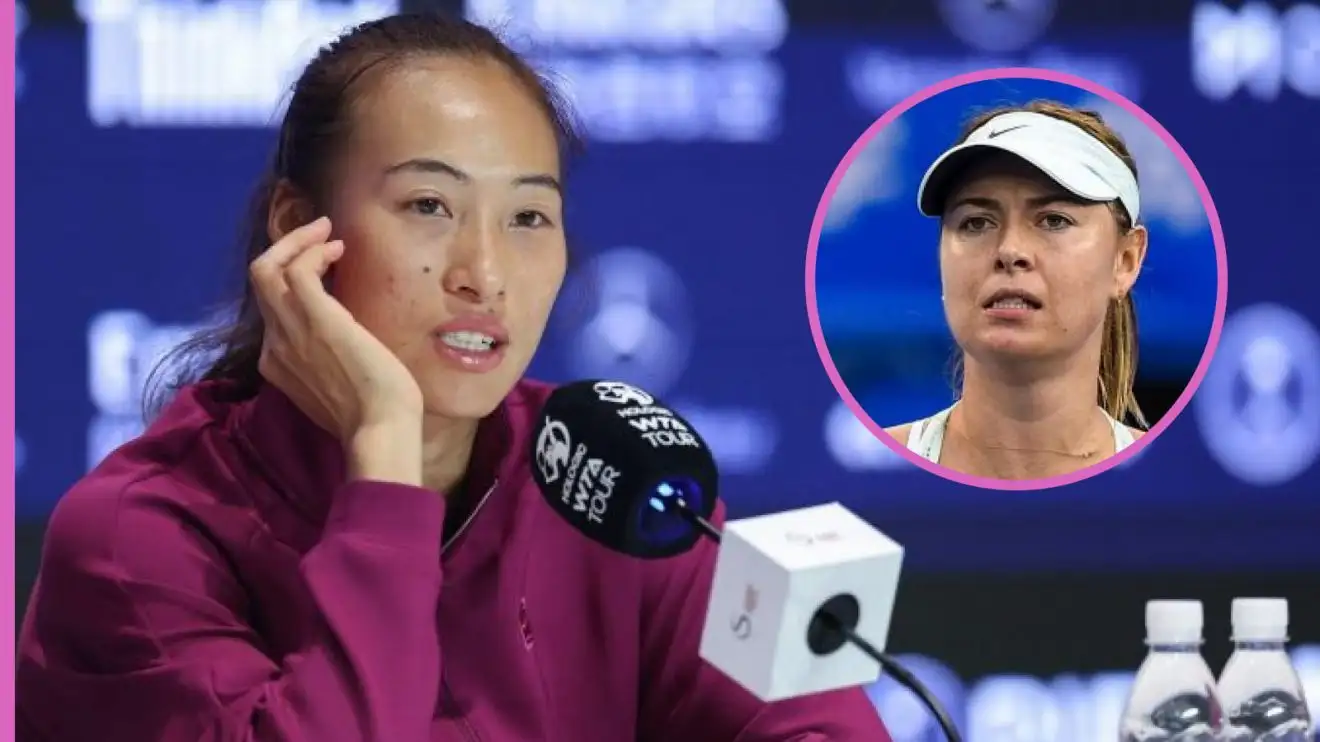
### Zheng Qinwen Embraces Competitive Distance in Women’s Tennis, Drawing Parallels to Maria Sharapova
Zheng Qinwen, currently ranked No. 7 in the WTA Rankings, has made waves in the world of women’s tennis with her impressive rise in 2024. Not only has she solidified her position among the elite players, but she has also garnered attention for her unique approach to relationships on the tour. The 22-year-old Chinese star recently opened up about her preference to maintain a distance from her fellow competitors, echoing sentiments reminiscent of former world No. 1 Maria Sharapova.
Qinwen’s trajectory this season has been nothing short of remarkable. She has made history by becoming the first Chinese player to win a singles gold medal at the Olympic Games, and her performance at the Australian Open, where she reached the final, further cemented her status as a rising star. Additionally, her two WTA titles this year have contributed to her reputation as one of the most talked-about players in the sport. However, with such success comes scrutiny, and Qinwen has faced criticism from some of her peers.
After a match at the Olympics, American player Emma Navarro described Qinwen’s competitive style as “cut-throat,” highlighting the fierce nature of their contest. Similarly, Croatian player Donna Vekic conveyed a comparable sentiment after their intense showdown in the Olympic final. These comments have sparked discussions about the dynamics of competition and camaraderie on the WTA Tour, particularly in light of Qinwen’s own views on forming friendships with fellow players.
When asked about her relationships with other players ahead of her debut at the WTA Finals, Qinwen candidly expressed her belief that forming close friendships on the tour is not conducive to her competitive spirit. “My answer is very clear; I always prefer to keep my distance from other players,” she stated. This perspective reveals her understanding of the intense competition that characterizes professional tennis.
Qinwen elaborated on her reasoning, explaining, “There is a lot of competition between us. I am a very sensitive girl. I don’t feel like I can become friends with someone and then have to compete on the court; I wouldn’t focus 100% to fight.” This introspection underscores her commitment to maintaining her competitive edge while navigating the complexities of interpersonal relationships in a high-stakes environment.
Her assertion raises a thought-provoking question: can friendship coexist with fierce competition? For Qinwen, the answer seems to be a resounding no. “As soon as I encourage myself, I would feel weird. Deep down, if it’s a friend, I want her to win and succeed in life. It’s the opposite of what I think in a tennis tournament,” she explained. This clarity of thought has led her to the conclusion that prioritizing competition over personal relationships is essential for her success.
Qinwen’s philosophy mirrors that of Sharapova, who famously maintained a certain distance from her peers throughout her illustrious career. Known for her fierce competitive spirit, Sharapova once said, “I think everyone knows this is my job here. When I’m on the courts or when I’m on the court playing, I’m a competitor, and I want to beat every single person, whether they’re in the locker room or across the net.” This mindset has resonated with many athletes, as it reflects the balance between professional ambition and personal relationships in competitive sports.
In her debut match at the WTA Finals, Qinwen faced top seed and title favorite Aryna Sabalenka, ultimately losing 6-3, 6-4. This defeat served as a reminder of the high stakes involved at this level of competition. However, it also presented an opportunity for reflection and growth. As she prepares for her next match against fifth seed Elena Rybakina, the pressure is on for both players. Rybakina, having lost her opening match to Jasmine Paolini, will also be seeking redemption.
The matchup between Qinwen and Rybakina is set to be a pivotal contest, potentially influencing the trajectory of both players in the tournament. For Qinwen, this encounter represents a chance to rebound from her initial setback and reinforce her determination to excel in a fiercely competitive environment. The stakes are high, and the outcome could have significant implications for their respective campaigns at the WTA Finals.
As the tournament unfolds, Qinwen’s approach to competition will continue to be a topic of interest among fans and analysts alike. Her decision to keep her distance from other players raises questions about the broader culture of the WTA Tour, where relationships often intertwine with competition. While some players thrive in a more collegial atmosphere, others, like Qinwen, find that maintaining a competitive edge requires a different strategy.
In a sport where every match can determine career trajectories, the need for focus and commitment is paramount. Qinwen’s self-awareness and clarity regarding her competitive mindset are commendable, and they may serve as an example for other young players navigating similar challenges on the professional circuit.
As the WTA Finals progress, fans will be keenly watching Qinwen’s journey, not only to see how she performs on the court but also to observe how her philosophy on competition and friendship shapes her career. In an era where the balance between personal connections and professional ambition is constantly being tested, Zheng Qinwen’s approach offers a fresh perspective on what it means to be a competitor in modern tennis. Her determination to prioritize competition over camaraderie might resonate with many athletes facing the same dilemmas, ultimately contributing to the rich tapestry of narratives that define the world of sports.
Leave a Reply